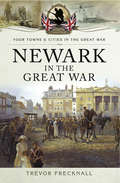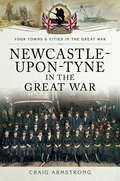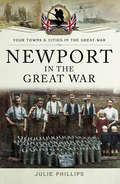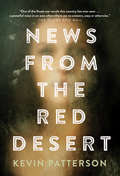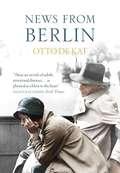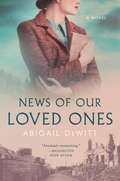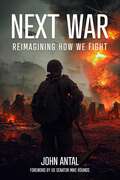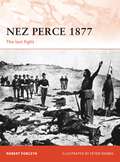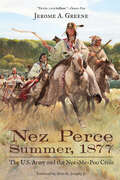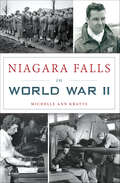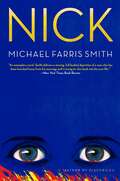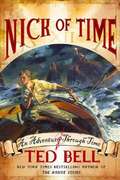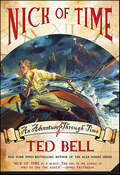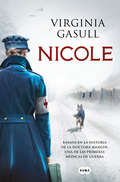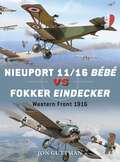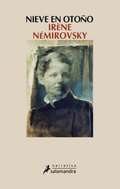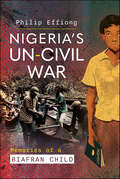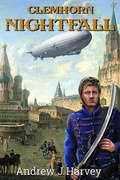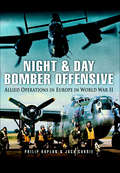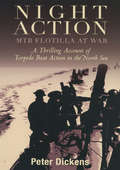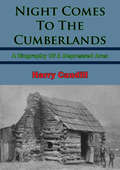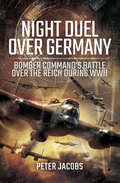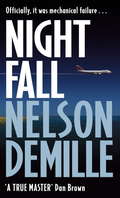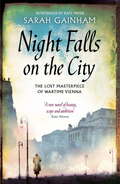- Table View
- List View
Newark in the Great War: Your Towns And Cities In The Great War (Your Towns & Cities in the Great War)
by Trevor FrecknallNewark-on-Trent's position at the crossroads of the Great North Road and Fosse Way plus the Great North Eastern and Midland railway lines left inhabitants endlessly fearful that it would be a prime target when rather than if the Germans attacked England from the North Sea. The East Midlands town had been besieged during the Civil War; and the Vicar of the Parish Church lost no time in August 1914 urging the menfolk to keep the enemy far from the town's boundaries. Thousands left their rat-invested hovels to fight for King and Country. Their womenfolk took their places in factories that switched from making wooden buildings and agricultural machinery to manufacturing munitions. The children were taught for only half-days after their schools became barracks for trainee soldiers, were encouraged to spend their holidays working on farms and were allowed to leave education aged only 13 so that they could start work.As featured on BBC Radio Nottingham and in the Newark Advertiser and Bingham Advertiser.
Newcastle-Upon-Tyne in the Great War (Your Towns & Cities in the Great War)
by Craig ArmstrongWith the large number of troops stationed in and around the area and its position as a major industrial city, which focused on armaments production, shipbuilding and heavy engineering, the realities of the war were always prominently felt in Newcastle-upon-Tyne. The city played a key role in the nation's war effort, as it was a key port and the nation's major exporter of coal a vital link in keeping the war effort going.The proud tradition of military service in the region was reflected in the huge numbers of Newcastle men and women who came forward to serve in the military or in roles such as nursing. The city was the recruitment centre and driving force for the formation of numerous 'Pals' Battalions and the Northumberland Fusiliers, which raised more battalions than any other regiment during the war.For many of those left behind the war was a time of fear and hardship. This book documents the struggle that many suffering families faced in coping with rising wartime prices, longer working hours, endless worry, wartime policies and severe shortages. These issues are brought to light throughout, with a view to how they affected the people of Newcastle and how, with audacity and courage, Newcastle's citizens overcame them. By the end of the war so many Newcastle men had been killed, and others faced an uncertain future in a shattered post-war economy. Despite this, the workers of Newcastle continued to provide incredible charitable support until the end of the war in addition to their already momentous efforts. These efforts are considered greatly in this enlightening book, which is a testimony to the bravery, self-sacrifice and determination of the people of Newcastle-upon-Tyne during the Great War.
Newport in the Great War
by Julie PhillipsWars affect everyone. Whether they are fought on the battlefields or on the home front, by the armed forces or civilians, sacrifices have to be made, and everyone suffers one way or another. This book gives a flavour of what it was like to live in Newport and the surrounding area during the Great War years. Newport was proud to send its brothers, husbands, uncles and fathers to fight for King and Country, many of whom had never been far from home before, some who came from decorated service backgrounds for whom the armed services was in their blood. Rich or poor, farm worker, office manager or son of a wealthy estate owner, they all united to defend their town and protect British values and way of life. Life continued as usual for many of those on the home front, despite, amongst other things, the introduction of DORA, rationing and the loss of the labour force from the farms. Newport was already generous in its giving to the poor but this was taken to a whole new level with the introduction of many national and local war charities. They knitted, sewed, auctioned and sung their way through the war one Newport women even drove the first tractor in Shropshire, playing no small part in the war effort.This show of patriotism and stoicism was made against the backdrop of a bloody and heinous war that went on far longer than anticipated. The constant threat of receiving the dreaded telegram indicating their loved ones fate was never far from the minds of Newport's civilians, yet the people of Newport kept the home fires burning brightly.
News From the Red Desert: A novel
by Kevin PattersonFrom the award-winning author of The Water in Between and Consumption, the definitive novel of the Afghanistan war.News From the Red Desert begins in late 2001, when everyone believes the war is already won and the Taliban defeated, then leaps late in the severely escalated conflict--into the mess, and death, and confusion. At its heart are the men and women who have come to Afghanistan to seek purpose, and adventure, and danger, by engaging in the most bewitching and treacherous of human pursuits: making war. It's the story of Deirdre O'Malley, an American journalist who had been covering municipal politics when the airplanes went into the towers. Now a war correspondent, she has come to love the soldiers she covers and to grieve so hard over their wounds and their deaths she considers herself a member of the mission too. Embedded with Canadian infantry, she can't ignore the situation on the ground. Her loyalty toward her ex-lover, the American general who has taken command of the theatre, wavers as the war wavers, and the use of torture and the slaughter of civilians is brought to light. Fuelling the tension is a melancholy American supply sergeant who accidentally releases a trove of war porn online that sparks a furious hunt for the person who leaked it. Fearing arrest at any moment, he has stayed on too long in Kandahar for reasons he doesn't understand himself. Caught up in these currents are the Pakistanis who operate the Green Beans café on the Kandahar Airfield, led by optimist Rami Issay, who wants to lighten his customers' hearts (and make a success of his business) by running film and chess clubs in the only zone of recreation on the base. But the war intrudes even into the lives of the well-intentioned. In a powerful climax that tests everyone's loyalty and faith, the essential chaos of violence asserts itself. Love and desire endure, but no-one escapes unscathed.
News from Berlin
by Otto de KatJune 1941. Dutch diplomat Oscar Verschuur has been posted to neutral Switzerland. His family is spread across Europe. His wife Kate works as a nurse in London and their daughter Emma is living in Berlin with her husband Carl, a 'good' German who works at the Ministry of Foreign Affairs. Briefly reunited with her father in a restaurant in Geneva, Emma drops a bombshell. A date and a codename, and the fate of nations is placed in Verschuur's hands: June 22, Barbarossa. What should he do? Warn the world, or put his daughter's safety first? The Gestapo are watching them both. And with Stalin lulled by his alliance with Hitler, will anyone even listen? Otto de Kat is fast gaining a reputation as one of Europe's sharpest and most lucid writers. News from Berlin, a book for all readers, a true page-turner driven by the pulse of a ticking clock, confirms him as a storyteller of subtly extravagant gifts.
News of Our Loved Ones: A Novel
by Abigail DeWittSet in France and America, News of Our Loved Ones is a haunting and intimate examination of love and loss, beauty and the cost of survival, witnessed through two generations of one French family, whose lives are all touched by the tragic events surrounding the D-Day bombings in Normandy.What if your family’s fate could be traced back to one indelible summer?Over four long years, the Delasalle family has struggled to live in their Nazi occupied village in Normandy. Maman, Oncle Henri, Yvonne, and Françoise silently watched as their Jewish neighbors were arrested or wordlessly disappeared. Now in June 1944, when the sirens wail each day, warning of approaching bombers, the family wonders if rumors of the coming Allied invasion are true—and if they will survive to see their country liberated.For sixteen-year-old Yvonne, thoughts of the war recede when she sees the red-haired boy bicycle past her window each afternoon. Murmuring to herself I love you, I love you, I love you, she wills herself to hear the whisper of his bicycle tires over the screech of Allied bombs falling from the sky.Yvonne’s sister, Geneviève, is in Paris to audition for the National Conservatory. Pausing to consider the shadow of a passing cloud as she raises her bow, she does not know that her family’s home in Normandy lies in the path of British and American bombers. While Geneviève plays, her brother Simon and Tante Chouchotte, anxiously await news from their loved ones in Normandy.Decades later, Geneviève, the wife of an American musician, lives in the United States. Each summer she returns to her homeland with her children, so that they may know their French family. Geneviève’s youngest daughter, Polly, becomes obsessed with the stories she hears about the war, believing they are the key to understanding her mother and the conflicting cultures shaping her life.Moving back and forth in time, told from varying points of view, News of Our Loved Ones explores the way family histories are shared and illuminates the power of storytelling to understand the past and who we are.
Next War: Reimagining How We Fight
by John F. Antal"...a useful addition to the literature of the changing character of war. Its scoping and focus, and its application of the identified disruptors to current challenges offer immediate insights for today’s commanders and defence policymakers." — The Wavell Room The nature of war is constant change. We live in an era of exponential technological acceleration which is transforming how wars are waged. Today, the battlespace is transparent; multi-domain sensors can see anything, and long-range precision fire can target everything that is observed. Autonomous weapons can be unleashed into the battlespace and attack any target from above, hitting the weakest point of tanks and armored vehicles. The velocity of war is hyper-fast. Battle shock is the operational, informational, and organizational paralysis induced by the rapid convergence of key disrupters in the battlespace. It occurs when the tempo of operations is so fast, and the means so overwhelming, that the enemy cannot think, decide, or act in time. Hit with too many attacks in multiple domains, all occurring simultaneously, the enemy is paralyzed. In short, the keys to decisive victory in war is to generate battle shock. Imagine a peer fight against Communist China, a new war in Europe against a resurgent Russia, or a conflict against Iran in the Middle East. How can our forces survive an enemy-first strike in these circumstances? Can we adapt to the ever-accelerating tempo of war? Will our forces be able to mask from enemy sensors? How will leaders execute command and control in a degraded communications environment? Will our command posts survive? Will our commanders see and understand what is happening in order to plan, decide, and act in real time? This book addresses these tough questions and more.
Nez Perce 1877
by Peter Dennis Robert ForczykOsprey's examination of one of the most famous battles of the latter part of the American Indian Wars (1622-1918). With the wars between the US and the Native Americans drawing to a close, one tribe in Eastern Oregon continued to resist. The Nez Perce, led by the "Red Napoleon" Chief Joseph, refused to surrender and accept resettlement. Instead, Chief Joseph organized a band of 750 warriors and set off for the Canadian border, pursued by 2,000 US Army troops under Major-General Oliver Howard. The army chased the natives for three months, fighting 13 actions. Finally, just 40 miles from the Canadian border, the Army ran Chief Joseph to the ground, and forced him to surrender after a five-day battle near Bear Paw Mountain.
Nez Perce Summer, 1877: The U.S. Army and the Nee-Me-Poo Crisis
by Jerome A. GreeneNez Perce Summer, 1877 tells the story of a people&’s epic struggle to survive spiritually, culturally, and physically in the face of unrelenting military force. Written by one of the foremost experts in frontier military history, Jerome A. Greene, and reviewed by members of the Nez Perce tribe, this definitive treatment of the Nez Perce War is the first to incorporate research from all known accounts of Nez Perce and U.S. military participants. Enhanced by sixteen detailed maps and forty-nine historic photographs, Greene&’s gripping narrative takes readers on a three-and-one-half month 1,700-mile journey across the wilds of Idaho, Wyoming, and Montana territories. All of the skirmishes and battles of the war receive detailed treatment, which benefits from Greene&’s astute analysis of the strategies and decision making on both sides. Between 100 and 150 of the more than 800 Nez Perce men, women, and children who began the trek were killed during the war. Almost as many died in the months following the surrender, after they were exiled to malaria-ridden northeastern Oklahoma. Army deaths numbered 113. The casualties on both sides were an extraordinary price for a war that nobody wanted but whose history has since fascinated generations of Americans.
Niagara Falls in World War II (Military)
by Michelle Ann KrattsNiagara Falls, both a natural wonder and a tourist destination, played a prominent role on the homefront during the Second World War. Many men and women worked diligently stateside in wartime industrial plants. One of the area's largest employers, Bell Aircraft, produced P-39 Airacobras and P-63 Kingcobra fighter planes. The company also contributed to more than thirty thousand aircraft for America and its Allies. Other residents, including Mayor Edward W. Mirrington Jr., were called to serve. Through numerous personal interviews, photos and wartime recipes, author and local historian Michelle Ann Kratts honors the World War II efforts of locals both at home and abroad.
Nick
by Michael Farris SmithCritically acclaimed novelist Michael Farris Smith pulls Nick Carraway out of the shadows and into the spotlight in this "masterful" look into his life before Gatsby (Richard Russo, Pulitzer Prize-winning author of EMPIRE FALLS and CHANCES ARE…) Before Nick Carraway moved to West Egg and into Gatsby's periphery, he was at the center of a very different story-one taking place along the trenches and deep within the tunnels of World War I. Floundering in the wake of the destruction he witnessed firsthand, Nick delays his return home, hoping to escape the questions he cannot answer about the horrors of war. Instead, he embarks on a transcontinental redemptive journey that takes him from a whirlwind Paris romance-doomed from the very beginning-to the dizzying frenzy of New Orleans, rife with its own flavor of debauchery and violence. An epic portrait of a truly singular era and a sweeping, romantic story of self-discovery, this rich and imaginative novel breathes new life into a character that many know but few have pondered deeply. Charged with enough alcohol, heartbreak, and profound yearning to paralyze even the heartiest of golden age scribes, Nick reveals the man behind the narrator who has captivated readers for decades.
Nick of Time (Nick McIver Series #1)
by Ted BellNick and Kate come to the aid of their father who is engaged in a war of espionage with German U-boat that are circling the islands. The information they provide to Winston Churchill is vital as he tries to warn England of the Nazi invasion.
Nick of Time (Nick McIver Time Adventures)
by Ted BellNick of Time is the first young reader's book written by bestselling author Ted Bell - a wondrous tale of time travel, adventure, and riches, in which twelve-year-old Nick McIver sets out to become "the hero of his own life."The setting is England, 1939, on the eve of war. Nick and his younger sister, Kate, live in a lighthouse on the smallest of the Channel Islands. Nick and Kate come to the aid of their father who is engaged in a desperate war of espionage with German U-boat wolf packs that are circling the islands. The information they provide to Winston Churchill is vital as he tries to warn England of the imminent Nazi invasion. One day Nick discovers an old sea chest, left for him by his ancestor, Captain Nicholas McIver of the Royal Navy. Inside, he finds a time machine and a desperate plea for help from the captain. He uses the machine to return to the year 1805. Captain McIver and, indeed, Admiral Nelson's entire fleet are threatened by the treachery of the French and the mutinous Captain Billy Blood. Nick must reach deep inside, using his wits, courage, and daring to rescue the imperiled British sailors.His sister, Kate, meanwhile, has enlisted the aid of two of England's most brilliant "scientific detectives," Lord Hawke and Commander Hobbes, to thwart the invading Nazis. She and Nick must face England's underwater enemies, a challenge made all the more difficult when they discover the existence of Germany's supersecret submarine.In this striking adventure for readers of all ages, Nick must fight ruthless enemies across two different centuries, on land and sea, to help defeat those determined to destroy his home and his family.
Nicole
by Virginia GasullLa valiente historia de la primera mujer médico del ejército francés durante la Primera Guerra Mundial Nicole es un homenaje al papel de los sanitarios a lo largo de la historia. Al estallar la Primera Guerra Mundial, la doctora Nicole Mangin recibe por error una orden de alistamiento en la que la confunden con un hombre. En vez de revelar su verdadera identidad, se presenta y se convierte en la única mujer que sirve como médico en el ejército francés a lo largo de todo el conflicto. Después de una documentación minuciosa y varios años de investigación, la escritora vasca Virginia Gasull ofrece a los lectores una novela histórica que pone de relieve la labor de los sanitarios en la Primera Guerra Mundial y recrea de forma magistral el ambiente bélico de esos años y el papel que desempeñaron en la contienda mujeres como Nicole. Nicole es un homenaje al cuerpo médico, a la ciencia y a los cuidados de los sanitarios en situaciones extremas a lo largo de la Historia. Los lectores han dicho sobre In vino veritas:«La autora crea una mezcla muy interesante de novela policiaca con toques justos de erotismo y todo ello envuelto en el apasionante mundo del vino. Muy recomendable».Amazon «La investigación que necesitas para reencontrarte con el suspense».Glamour «He leído tu novela y me ha encantado, Virginia. Enhorabuena».Juan Echanove «In vino veritas, una novela apasionante».Revista Vinos y Restaurantes «Esta novela cuenta con ingredientes que hacen de ella una obra cautivadora desde la primera a la última página».Revista Vinetur «Un buen librobasado en tres pilares: la intriga policial, el mundo del arte y el mundo del vino. ¡Y no es necesario saber ni de arte ni de vinos para disfrutarlo!».Amazon
Nieuport 11/16 Bébé vs Fokker Eindecker
by Jim Laurier Jon GuttmanThe Nieuport 11 boasts an important place in the technology race against German aircraft in World War I aerial warfare. It eventually led Nieuport to produce the first plane flown in large numbers in aerial combat by the United States.The appearance in July 1915 of Germany's Fokker E I, armed with interrupter gear that allowed its machine gun to fire forward without striking the propeller, heralded a reign of terror over the Western Front that the Allies called the "Fokker Scourge". Among several alternative means for countering the Fokkers, until the Allies introduced practical synchronisation mechanisms of their own, was the French Nieuport - 11 a single-seat version of the Nieuport 10 sesquiplane ("one-and-a-half wing") mounting a Lewis machine gun above the upper wing, firing over the airscrew. Nicknamed the Bébé because of its comparatively small size, the Nieuport 11 was, though less robust than true biplanes, superior in structure and overall performance to the German monoplane. During 1916 the Nieuport 11, and its more powerful but more difficult to control stablemate, the Nieuport 16, battled a succession of improved Fokkers, the E II, E III and E IV, until the Germans abandoned the monoplane in favour of a new and deadly generation of biplane fighters. Even so, the Bébé's early successes also influenced the Germans to adopt sesquiplane designs of their own - most notably the Albatros D III and D V - while Nieuport also held on to the sesquiplane format longer than it should have. Fully illustrated with specially commissioned full-colour artwork, this is the absorbing story of the clash between these two innovative fighters at the height of World War I.
Nieve en otoño
by Irène NémirovskyEn este breve relato sobre el exilio y la nostalgia, Némirovsky exhibe una vez más el don de aproximar sus personajes a los lectores y de evocar situaciones como si la frontera entre lo real y lo imaginario no existiese. La anciana Tatiana Ivanovna ha dedicado toda su vida a servir a sus señores, los Karin, a quienes ha visto nacer y crecer en la mansión de Sujarevo, en las inmediaciones de Moscú. Cuando la familia se ve obligada a huir por la Revolución de Octubre, la fiel criada termina por reunirse con ellos en París, donde, a pesar de que los Karin han perdido su posición social y su fortuna, continúa a su servicio en el modesto apartamento en que residen. Supervivientes de un mundo perdido, los Karin y su sirvienta necesitarán olvidar para salir adelante, pero la vieja Tatiana nunca deja de soñar con su tierra natal, ni de sufrir para adaptarse a la vida en un lugar donde las primeras nieves no llegan hasta pasado el otoño. Al igual que su admirado Chéjov, Irène Némirovsky tiene un talento especial para observar y captar los detalles más reveladores de la intimidad de sus personajes. El lector encontrará aquí el germen de la imponente Suite francesa, y llegará al final de esta breve novela con la sensación de haber realizado un intenso viaje emocional.
Nigeria's Un-Civil War: Memories of a Biafran Child
by Philip Effiong"The peace had been desecrated. I knew because people spoke in low tones and laughter dried up. Outside, things unfolded without grace or color, even the harmattan leaves were more skeletal than usual. The sun still shone but didn’t smile; it was as if it could tell that the worst was yet to come. Change should not have been bad, but this one was heavy and stubborn. Months later I learned about the 15 January 1966 coup d’état." In Nigeria’s un-Civil War: Memories of a Biafran Child, Philip Effiong reveals the many characters of war: the horror and the chaos, the surrealism and the absurdity and the desperate need to conjure a semblance of normalcy against a backdrop of air raids, starvation and massacre. This is his, and his family’s, story before, during and after the Biafra–Nigeria War of July 1967 to January 1970. He begins in Lagos with the January 1966 coup and describes his high-ranking military father’s narrow assassination escape at the hands of the executors of the second coup six months later. Flight and relocation dog the next three-and-a-half years as his family tries to maintain a sense of stability amid crumbling education, health services and failing infrastructure. Lessons in literacy and numeracy are exchanged for creativity in foraging as food becomes ever scarcer. Death, fear, destitution and the madness in which the family repeatedly finds itself are told obliquely through a child’s eyes and leave the reader gutted by the senselessness and cruelty of war, yet equally buoyed by the resilience of the Biafran people’s inextinguishable hope.
Nighfall (Clemhorn)
by Andrew J. HarveyAs the Cross-Temporal Empire slides towards a civil war that will threaten to destroy the C-T E and its 54 lines, the Clemhorns find themselves drawn into the struggle. A struggle not only for the future of the Empire, but for their very lives.
Night & Day Bomber Offensive: Allied Airmen in Europe in World World II (Pen And Sword Large Format Aviation Bks.)
by Philip Kaplan Jack CurrieFor much of World War II England provided the only western European base from which the British and American air forces could take the war into Nazi-occupied Europe and Germany itself. The American Eighth and Ninth Air Forces struck enemy targets by day at great distances, often on raids of eight or nine hours duration, while the RAF flew most of its demanding missions at night.This highly illustrated book will convey what it was like for pilots, aircrew and ground crew during their wartime service. It not only takes the reader on typical USAAF and RAF raids, but it also depicts the work of the mechanics and fitters as they struggled to keep battered aircraft airworthy, how the medics coped with the countless wounded who returned from the raids and looks at where the airmen relaxed within the various bases or in the local villages and towns. It will include period and later images of the bases, the aircraft, memorials and relevant locations in Britain, France and Germany. It will be a vivid and powerful human expression of the bomber airmen's wartime experience.
Night Action: MTB Flotilla at War: A Thrilling Account of Torpedo Boat Action in the North Sea
by Peter DickensA highly decorated Royal Navy officer recounts his experiences at the command of a motor torpedo boat in the North Sea during WWII. In 1942-43, Captain Peter Dickens commanded the 21st MTB Flotilla, mainly in the North Sea and the English Channel. In Night Action, he vividly recounts his experiences performing daring missions amid storms of gunfire, usually under the cover of darkness. Dickens and his crew managed to closely engage enemy convoys and escorts in high-speed attacks and wreak havoc among the German supply lines. Like the sailors who fought Nazi U-boats in the battle of the Atlantic, Dickens and his comrades were experiencing a new kind of warfare and had to develop techniques and tactics as they went along; their kind of action called for great courage, spilt-second timing and complete understanding between captain and crew. For his bravery and heroism, Dickens was awarded The Distinguished Service Order, a Distinguished Service Cross, and The Most Excellent Order of the British Empire. In Night Action, he offers a frank depiction of live aboard the 21st MTB Flotilla, combining comradery and humor with the true horror of war
Night Comes To The Cumberlands: A Biography Of A Depressed Area
by Harry M. ClaudillAt the time it was first published in 1962, it framed such an urgent appeal to the American conscience that it actually prompted the creation of the Appalachian Regional Commission, an agency that has pumped millions of dollars into Appalachia. <p><p> Caudill's study begins in the violence of the Indian wars and ends in the economic despair of the 1950s and 1960s. Two hundred years ago, the Cumberland Plateau was a land of great promise. Its deep, twisting valleys contained rich bottomlands. The surrounding mountains were teeming with game and covered with valuable timber. The people who came into this land scratched out a living by farming, hunting, and making all the things they need-including whiskey. <p> The quality of life in Appalachia declined during the Civil War and Appalachia remained "in a bad way" for the next century. By the 1940s, 50s, and 60s, Appalachia had become an island of poverty in a national sea of plenty and prosperity. Caudill's book alerted the mainstream world to our problems and their causes. Since then the ARC has provided millions of dollars to strengthen the brick and mortar infrastructure of Appalachia and to help us recover from a century of economic problems that had greatly undermined our quality of life.
Night Duel Over Germany: Bomber Command's Battle Over the Reich During WWII
by Peter JacobsBomber Commands night offensive against Nazi Germany, which lasted for nearly six years, was one of Britains major contributions to the Allied effort during the Second World War. But the decision to conduct its main operations at night only came about following heavy losses by day, when its prewar medium bombers had been found lacking in modern air warfare. The Luftwaffe, too, had its early problems. Initially without a dedicated night fighter, it was ill-equipped to defend the Reich, and so the stage was set for what would become one of the most critical strategic encounters of the war.Things had to change on both sides. Soon there came new and more capable aircraft, in ever-increasing numbers, coupled with new tactics and technology, as each side strove to gain the upper hand. It became a fascinating encounter between the crews of Bomber Command and the Luftwaffes night fighter force, the Nachtjagd, with no shortage of courage and heavy losses on both sides. Amongst the epic encounters were Bomber Commands Thousand Bomber raids, the attack on the German V-weapons research establishment at Peenemnde, the campaigns against the industrial Ruhr, Hamburg and Berlin, and the disastrous raid on Nuremberg. This new publication consolidates accounts from both sides and from all ranks of service in an effort to provide a comprehensive account of some of the most ferocious nocturnal engagements of the Second World War.
Night Fall: Number 3 in series
by Nelson DeMilleFive years after the horrific crash of TWA Flight 800 over Long Island which killed 230 people, John Corey is inadvertently caught up in the now-closed case by his FBI lawyer wife, Kate, who believes the government's findings of mechanical failure is wrong. The FBI don't take kindly to the case being looked into again and, as John Corey's instincts and investigations clearly show anomalies, he and Kate are sent off to the Yemen and Tanzania for a month or so each as punishment. On his return, John is not put off - he has ten days' leave. Ten days in which to avoid the FBI and to find that elusive video tape taken by two adulterous lovers on the beach which may - or may not - show a sea-to-air missile racing up to hit the TWA Flight 800... An exciting, edge-of-the-seat thriller - Nelson DeMille's best to date.www.nelsondemille.net
Night Falls On The City: The Lost Masterpiece of Wartime Vienna
by Sarah GainhamVienna, 1938. Beautiful actress Julia Homburg and her politician husband Franz Wedeker embody all the enlightened brilliance of their native city. But Wedeker is Jewish, and just across the border the tanks of the Nazi Reich are primed for the Anschluss. When the SS invades and disappearances become routine, Franz must be concealed. With daring ingenuity, Julia conjures a hiding place. In the shadow of oppression, a clear conscience is a luxury few can afford, and Julia finds she must strike a series of hateful bargains with the new order if she and her husband are to survive.A highly acclaimed bestseller when first published in the 1960s, Night Falls on the City is a true lost classic, and an unforgettable portrait of wartime.
Night Falls On The City: The Lost Masterpiece of Wartime Vienna
by Sarah GainhamVienna, 1938. Beautiful actress Julia Homburg and her politician husband Franz Wedeker embody all the enlightened brilliance of their native city. But Wedeker is Jewish, and just across the border the tanks of the Nazi Reich are primed for the Anschluss. When the SS invades and disappearances become routine, Franz must be concealed. With daring ingenuity, Julia conjures a hiding place. In the shadow of oppression, a clear conscience is a luxury few can afford, and Julia finds she must strike a series of hateful bargains with the new order if she and her husband are to survive.A highly acclaimed bestseller when first published in the 1960s, Night Falls on the City is a true lost classic, and an unforgettable portrait of wartime.
